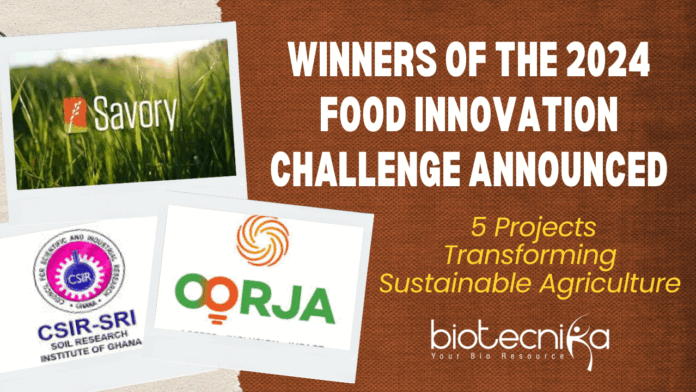Winners of the 2024 Food Innovation Challenge Announced:
5 Projects Transforming Sustainable Agriculture
Have you ever wondered if the answer to the global food crisis is not found in research labs but growing in a small farm in India?
What if the solution is hidden in the grazing lands of Kenya or tucked into peanut shells in Ghana?
As the world debates how to feed 10 billion people by 2050, here are a handful of bold innovators who are already working on it. With solar pumps, fungi-powered herbicides, and ancient farming techniques, these innovators are changing the world. And now, they have $1 million to prove that big change doesn’t always come from the top. It sprouts from the soil, communities, and local genius.
The Institute of Food Technologists (IFT) and the Seeding the Future Foundation will reveal the winners of the 2024 Seeding the Future Global Food System Challenge on July 9, 2025. A high-stakes competition that’s fast becoming the Oscars of food innovation.
With more than 1,200 entries from across the world, the Challenge crowned five game-changing projects. From climate change to nutrition equity, these projects are addressing the world’s most pressing food system challenges.
This is about real solutions, for real people, with real impact.
Solving the World’s Food Problems
The Challenge has provided a platform for bold new ideas from around the world over the last four years. From solar-powered irrigation in India to natural herbicides fighting crop-damaging weeds in East Africa, this year’s entries were a symbol of innovation at its best. All the winning projects shared a single goal: to build food systems that are healthier, fairer, and better for the planet.
There were applications from scientists, engineers, startups, and research teams, making the competitions the toughest. The results were awe-inspiring. Here is the list of how the funding was awarded:
- 8 Seed Grants of $25,000 each (announced in May 2025).
- 3 Growth Grants of $100,000 each.
- 2 Grand Prizes of $250,000 each.
Now, let’s meet the brains behind the innovations who are responsible for reshaping the future of food.
Grand Prize Food Innovation Challenge Winners
- Oorja Development Solutions (India)
Scaling Climate-Smart Farming Solutions
Imagine a small farmer in India who has to deal with unpredictable rains, temperatures, and unstable markets. Here comes Oorja, a social enterprise that is offering a Pay-Per-User model.
They assist farmers with solar-powered irrigation systems, soil testing, sustainable farming advice, and even a mobile app to make the process easier. Their solutions help small farm farmers access modern agricultural tools without incurring heavy investments. With this, yields are improved, leading to smart farming and empowering farmers.
2. Savory Institute – Kenya MARA Program (USA/Kenya)
Regenerating Land and Livelihoods Through Indigenous Wisdom
Another rooted and traditional revolution is unfolding in Kenya’s Maasai Mara. The Savory Institute’s Kenya MARA initiative is helping Maasai herders in grazing livestock on regenerating conservancies. They are blending traditional knowledge with ecological restoration. This helps revive cultural heritage and boost nutrition through indigenous diets. They are proving that sustainability can honor the past while feeding the future.
Growth Grant Food Innovation Challenge Winners
1. Council of Scientific and Industrial Research Institute – Savanah Agricultural Research Institute (CSIR-SARI) – Ghana
We all know that Aflatoxin contamination is a silent crisis in Africa. This makes food unsafe and undermines export markets. Ghana’s Savanna Agricultural Research Institute is developing a near-infrared (NIR) tool. This is to screen for aflatoxin-resistant groundnuts rapidly.
Combined with the discovery of two natural antifungal compounds in peanut seed coats, this dual-pronged approach empowers farmers in northern Ghana with a sustainable way to fight toxic mold, without resorting to chemical treatments.
2. Toothpick Company Limited (Kenya)
Striga, also known as “witchweed,” has long haunted farmers in Sub-Saharan Africa. But what if the solution to this parasitic danger lies in fungus? Toothpick Company has developed a fungus-based seed coating that defeats Striga. This bioherbicide doesn’t harm soil or other crops. Its cost-effective and environmentally friendly product is helping millions in Kenya, Uganda, Ethiopia, and Ghana.
3. Yayasan Kopernik – PANGAN Program (Indonesia)
Another centuries-old farming technique is making its comeback in Indonesia’s West Timor region. Yayasan Kopernik’s PANGAN program has built an indigenous agricultural practice. Also, promoting underutilized local foods to combat food insecurity. The program connects farmers to local markets and micro businesses. They have strengthened the Local Food Hub. It’s a holistic model that blends bioeconomy, sustainability, and nutrition.
More Than Just Winners: A Global Network of Change
All winners—along with finalists and semi-finalists—are inducted into the Seeding The Future Global Food System Impact Innovators Database and Network. This is not just a directory; it’s a curated ecosystem where investors, NGOs, intergovernmental agencies, and scientists can explore high-impact solutions tailored to global food challenges.
Users can sort innovations using AI-assisted search or traditional filters by focus area, sustainability metrics, or field applications such as school feeding programs or post-harvest loss reduction.
The Mission: Food That Nourishes People and Planet
Dr. Bernhard Van Lengerich, founder of the Seeding the Future Foundation, said that this year, innovations are not just inspirational but are essential. He added that each project reflects the power of science and collaboration in addressing food system challenges.
His vision is to have safe, nutritional, appealing, and equitable food for everyone. He believes that this won’t happen without radical innovation, localized solutions, and global partnerships.
From climate volatility to supply chain shocks, the world’s food system is under pressure. These winning innovations are providing a blueprint for actions along with the hope of a better future.
Whether it’s a solar pump in India or a fungal spray in Kenya, one truth stands clear: the future of food lies in the hands of those daring enough to rethink everything.























